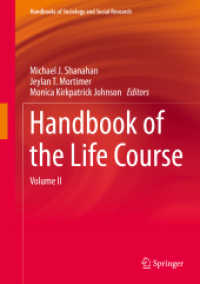- ホーム
- > 洋書
- > 英文書
- > History / World
基本説明
Attempts to address the relationships between forager-traders and the surrounding political, economic and social worlds of South and Southeast Asia.
Full Description
In both South and Southeast Asia, many upland groups make a living - in whole or part - through gathering and hunting, producing not only subsistence goods but commodities destined for regional and even world markets. These forager-traders have had an ambiguous position in ethnographic analysis, variously represented as relics, degraded hunter-gatherers, or recent upstarts. Forager-Traders in South and Southeast Asia adopts a multidisciplinary approach to these groups, presenting a series of comparative case-studies that analyse the long-term histories of hunting, gathering, trading, power relations, and regional social and biological interactions in this critical region. This book is a fascinating and important addition to the current 'revisionist' debate, and a unique attempt to re-conceptualize our knowledge of forager-traders within the surrounding context of complex polities, populations and economies in South and Southeast Asia.
Contents
1. Historicizing adaptation, adapting to history: forager-traders in South and Southeast Asia Kathleen D. Morrison; 2. Introduction Kathleen D. Morrison; 3. Hunting and gathering strategies in prehistoric India: a bio-cultural perspective on trade and subsistence John R. Lukacs; 4. Harappans and hunters: economic interaction and specialization in prehistoric India Gregory L. Possehl; 5. Gender and social organization in the reliefs of the Nilgiri Hills Allen Zagarell; 6. Pepper in the hills: upland-lowland exchange and the intensification of the spice trade Kathleen D. Morrison; 7. Introduction Laura L. Junker; 8. Hunters and traders in Northern Australia Sandra Bowdler; 9. Foragers, farmers, and traders in the Malaysian Peninsula Alan Fix; 10. Economic specialization and inter-ethnic trade between foragers and farmers in the Prehispanic Philippines Laura L. Junker.







